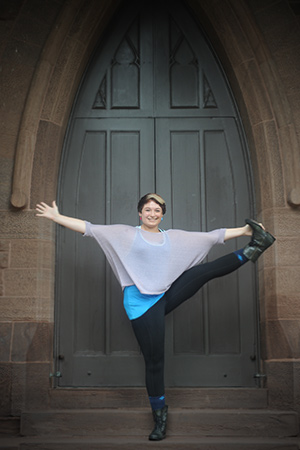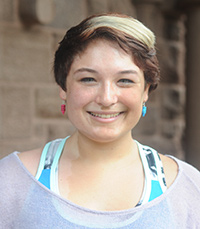Morgan ’14 Starting Thesis on Zombies in Haitian Literature, U.S. Movies

Anya Morgan is a member of the Class of 2014.
Q: Anya, happy senior year to you! What are you majoring in, and why did you decide on these majors?
A: Thank you! I’m majoring in English and French. I think I always knew I was going to be an English major, since my mom is an English teacher and raised me on books – it’s in my blood. I’ve also got some serious French Canadian roots on both sides of my family, so I’m able to practice speaking French with my grandparents. I guess both majors were predetermined!
Q: Where are you from and what attracted you to Wesleyan?
A: I’m from Los Angeles, and I went to an all-girls high school called Archer. Archer is tiny, but for some reason it’s kind of a feeder school for Wesleyan – out of my graduating class of about 80 girls, five are now at Wes. So, I had heard of it because of that, but what really won me over was when I visited the campus. I was deciding between Wesleyan and Cornell, so my mom and I went and visited both of them, and I was struck by the difference in the students’ attitudes. When I came to Wes everyone looked so excited to be there, my tour guide was this hippy-dippy girl wearing birkenstocks, and someone actually chased after the tour yelling “Come to Wes!” So, it was an obvious choice. The vibe is just great here.
Q: What classes are you taking this fall? Which ones are you most looking forward to taking?
A: This fall I’m going to be starting work on my thesis, so I’ll be taking fewer classes than usual. As of now, I’m going to be taking “Literatures of Lying” (English/Psych), “Paris, 19th Century” (French), and “The Empire Writes Back” (English). I might slip a swimming for fitness class in there somewhere. I’m most excited for “Literatures of Lying” because I’ve heard both the professors are wonderful but I haven’t yet taken any classes with them – it’s co-taught by the beloved Jill Morawski and Lisa Cohen.
Q: What is the topic of your thesis?
A: My thesis, which I’m also really excited for, is going to be about representations of zombies in Haitian literature as compared to representations of zombies in American horror movies. I’ve been studying the francophone islands of the West Indies for two semesters and have always had a fascination with American zombies, so I decided to marry the two ideas. I’m interested in the idea that in Haiti, zombies are an integral part of the culture and are valued as a product of their history, whereas American zombies represent things that we want to purge from society (e.g. Communists in Invasion of the Body Snatchers, consumerism in Dawn of the Dead). Se we’ll see what comes out of that.

Q: Tell us about your role as a new student orientation intern.
A: I’m often staffing the desk in the orientation office in Usdan, waiting to field calls and emails from new parents and students. That’s a big part of what we do. The other part is booking all the events for the eight days of orientation, as well as events for extended orientation, which takes place throughout September. My biggest task was compiling the materials for the orientation handbook (a schedule and description of all orientation events, plus a map and some other handy information), which every freshman gets on arrival day. That’s done now, thank goodness, so now I’m mostly double, triple, and quadruple checking that all the events I’m in charge of are booked and ready to go. It’s been a great summer job; I’ve gotten to know a lot of the Wesleyan admin staff and everyone is really wonderful. Not to mention the fact that I got to stay on campus all summer — it’s my favorite place to be.
Q: What other extracurricular activities are you involved in?
A: I’m a writing tutor, a yoga instructor, and I am involved with an anonymous, non-directive listening service on campus. I also took part in a training program under the direction of Dr. Jen D’Andrea, the director of Counseling and Psychological Services (CAPS), that sought to train students in the basics of mental health advocacy. The program feeds into a student group called WeSupport, which, alongside other groups such as Active Minds, works to destigmatize mental illness on campus and provide mental health resources to students who may not know how to navigate the university’s offerings.
I’ve found that my most rewarding extracurricular activities are ones that allow me to serve my community in some way. That look on a yogi’s face when ze masters a new pose, or the look on one of my writing tutee’s faces when ze crafts an awesome thesis – those moments make me so happy.
Q: When did you start practicing yoga? Tell us about the class you teach.
A: I started practicing yoga my junior year of high school, and trained as an instructor the summer after my sophomore year at Wes. I teach a semiweekly vinyasa yoga class as part of Wesleyan’s fitness collective, “Wesleyan Body and Mind” – those two days are always my favorite days of the week. I try to make upbeat playlists to keep my students motivated and having fun throughout the class. My favorite part of class is the abs section, where we do yogi-bicycle crunches to the poppiest, danciest song I can find. Everyone puts out such great effort.
Q: What will you miss most about Wesleyan?
A: Definitely my friends. I’m so not ready to go into a new place and start from scratch when I have met such amazing, caring people here. I’m still trying to coordinate post-Wes plans with some of them because we just can’t let each other go! I’ll also miss the liberal ‘tude on campus – I don’t know where else in the world I’m going to meet so many awesome queer feminists. Maybe San Francisco.
Q: What are your post Wesleyan plans?
A: I’m applying to law schools on and around the West coast. I want to study gender/sexuality law and eventually end up somewhere where I can advocate for disadvantaged queer youth. That’s the plan as of now, but I’ve heard that once law school actually starts, many people totally reevaluate what kind of law they want to practice. I promise I’m going to do something important, though! I’ll bury this interview as a time capsule, open it in three to four years, and get back to you about what actually went down.

